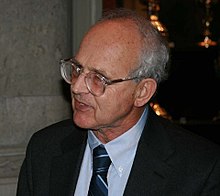Rainer "Rai" Weiss (/waɪs/; German: [vaɪs]; born September 29, 1932) is a German-born American physicist of partly Jewish descent (his father was Jewish).[1]
Rainer Weiss | |
|---|---|
 Weiss in December 2006 | |
| Born | September 29, 1932 |
| Education | Massachusetts Institute of Technology (BS, MS, PhD) |
| Known for | Pioneering laser interferometric gravitational wave observation |
| Awards | Einstein Prize (2007) Special Breakthrough Prize in Fundamental Physics (2016) Gruber Prize in Cosmology (2016) Shaw Prize (2016) Kavli Prize (2016) Harvey Prize (2016) Princess of Asturias Award (2017) Nobel Prize in Physics (2017) |
| Scientific career | |
| Fields | Physics Laser physics Experimental gravitation Cosmic background measurements |
| Institutions | Massachusetts Institute of Technology |
| Thesis | Stark Effect and Hyperfine Structure of Hydrogen Fluoride (1962) |
| Doctoral advisor | Jerrold R. Zacharias |
| Doctoral students | Dirk Muehlner, David Owens, Patricia Downey , Daniel Dewey, Jeffrey Livas, Nelson Christensen, Peter Fritschel, Michelle Stephens, Joseph Kovalik, Joseph Giaime, Partha Saha, Nergis Mavalvala, Brett Bochner, Brian Lantz, Julien Sylvestre, Ryan Lawrence, Rana Adhikari |
| Other notable students | Bruce Allen |
Works
changeHe is known for his works in gravitational physics and astrophysics. He is a professor of physics emeritus at MIT. He is best known for inventing the laser interferometric technique which is the basic operation of LIGO.
Weiss was Chair of the COBE Science Working Group.[2][3][4]
In 2017, Weiss was awarded the Nobel Prize in Physics, along with Kip Thorne and Barry Barish, "for decisive contributions to the LIGO detector and the observation of gravitational waves".[5][6][7][8]
References
change- ↑ "Emvogil-3.mit.edu" (PDF). Archived from the original (PDF) on 2014-12-09. Retrieved 2017-10-09.
- ↑ Lars Brink (2 June 2014). Nobel Lectures in Physics (2006 – 2010). World Scientific. pp. 25–. ISBN 978-981-4612-70-8.
- ↑ "NASA and COBE Scientists Win Top Cosmology Prize". NASA. 2006. Archived from the original on 3 March 2016. Retrieved 22 February 2016.
- ↑ Weiss, Rainer (1980). "Measurements of the Cosmic Background Radiation". Annu. Rev. Astron. Astrophys. 18: 489–535. Bibcode:1980ARA&A..18..489W. doi:10.1146/annurev.aa.18.090180.002421. S2CID 121134404.
- ↑ "The Nobel Prize in Physics 2017". The Nobel Foundation. 3 October 2017. Retrieved 3 October 2017.
- ↑ Rincon, Paul; Amos, Jonathan (3 October 2017). "Einstein's waves win Nobel Prize". BBC News. Retrieved 3 October 2017.
- ↑ Overbye, Dennis (3 October 2017). "2017 Nobel Prize in Physics Awarded to LIGO Black Hole Researchers". The New York Times. Retrieved 3 October 2017.
- ↑ Kaiser, David (3 October 2017). "Learning from Gravitational Waves". The New York Times. Retrieved 3 October 2017.